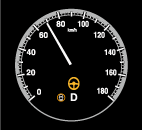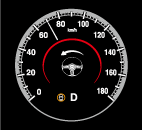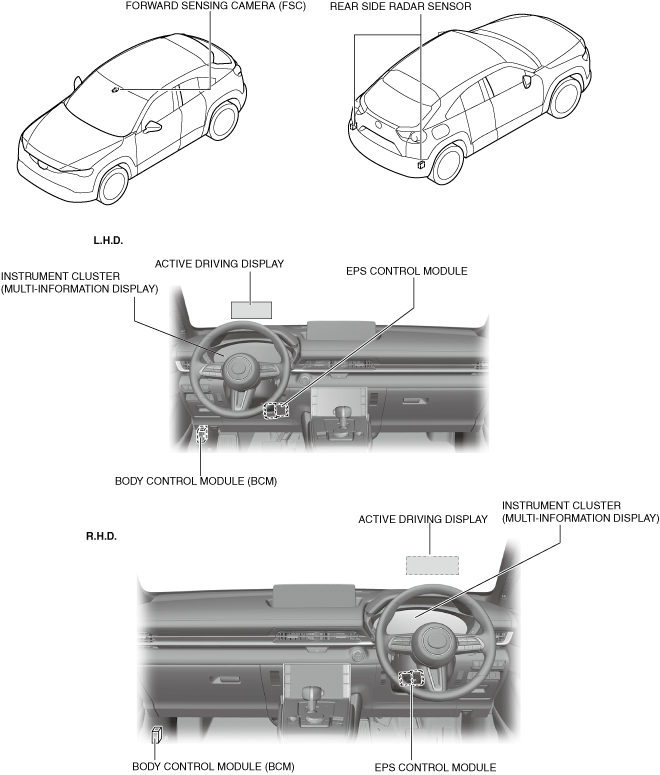EMERGENCY LANE KEEPING [BLIND SPOT ASSIST] [(E)]
id1510000153a4
Outline
• If there is the possibility of a collision with a vehicle in an adjacent lane, the system provides steering assistance to avoid a departure from the driving lane.
• The system detects the vehicle lane lines (lane markers) while the vehicle is being driven and it detects vehicles in adjacent lanes using the rear side radar sensors. If the system detects that there is the possibility of a collision with a vehicle in an adjacent lane due to the detecting vehicle changing lanes or departing from its lane, the system operates the electric power steering and assists the driver in operating the steering wheel.
-
Warning
-
• The emergency lane keeping [blind spot assist] is not an autonomous driving system. In addition, because the system is not designed to compensate for not paying attention to the conditions at the sides of the vehicle, over-reliance on the system could result in an accident.
• The detection ability of the emergency lane keeping [blind spot assist] function is limited. Always stay on course using the steering wheel and drive with care.
• Do not use the emergency lane keeping [blind spot assist] under the following conditions. Otherwise, it could lead to an accident.
-
― Vehicle is driven on slippery roads such as icy or snow-covered roads, and unpaved roads
― Tires other than specified size, such as temporary spare tire, are used
― Tires without sufficient groove are used
― Tire pressure not adjusted to specified value
― Towing camping trailer or boat trailer
― Tire chains are installed
― Vehicle is driven on roads other than expressways and highways with white lines (yellow lines)
-
Caution
-
• To ensure that the emergency lane keeping [blind spot assist] operates normally, heed the following precautions.
-
― Do not modify the suspension
― Always install tires of the specified size to all four wheels
-
Note
-
• The emergency lane keeping [blind spot assist] may not operate normally under the following conditions.
-
― Road edge such as curbs without height or road boundaries with no difference in road surface color is invisible
― Road edge cannot be detected due to weather (rain, fog, snow)
― Road edge and indiscernible lines such as road maintenance markings, guardrail shadows, residual snow, or water-filled road ruts are visible
― Surrounding brightness suddenly changes such as when entering or exiting tunnel
― Width of road is narrow or wide
― Vehicle is tilted by heavy cargo in luggage compartment or rear seat
― At night, headlight lens is dirty and illumination is weak or its optical axis is deviated
― There is large amount of snow or mud adhering to rear bumper near rear side radar sensor
― Road is winding
― Vehicle is shaken heavily due to hitting road bump
― Poor road edge visibility due to vehicle ahead traveling near road edge
― Windshield is dirty or fogged
― Vehicle is subjected to strong light from vehicle front (sunlight or headlights (high beam) from on-coming vehicle)
― Large difference in vehicle speeds between detecting vehicle and vehicle driving in adjacent lane
― Approaching vehicle has the following shape
-
• Vehicle body size is extremely small
• Vehicle height is extremely low or high
• Vehicle has a complex shape
Structural View
Function
• The body control module (BCM) and the EPS control module assist the driver in operating the steering wheel based on vehicle information of the driving lane boundary (lane marker) detected by the forward sensing camera (FSC) and the vehicle in an adjacent driving lane detected by the rear side radar sensors. For details on the forward sensing camera (FSC), refer to the [FORWARD SENSING CAMERA (FSC)]. (See
FORWARD SENSING CAMERA (FSC) [(E)].)
• With the emergency lane keeping [blind spot assist], the steering wheel operation assist can be changed between operational and non-operational using the personalization features. For details on personalization features, refer to [PERSONALIZATION FEATURES] in the workshop manual.
Steering wheel operation assist
-
• If the possibility of a collision with a vehicle in an adjacent lane increases due to the detecting vehicle changing lanes or departing from its lane, the system assists the driver in operating the steering wheel to prevent a road departure.
• The multi-information display notifies the driver of which direction the steering wheel operation is being assisted.
Emergency lane keeping [blind spot assist] warning
-
• When the system is operated under the following conditions, the warning sound from the notification and warning speaker is activated to alert the driver.
-
― Steering wheel operation assist performed continuously for 10 s or more
― Steering wheel operation assisted 2 or more times within continuous interval of 180 s without driver intervention
System conditions display
System conditions display table
|
Emergency lane keeping [blind spot assist] status
|
Status
|
Emergency lane keeping (ELK) OFF indicator light
|
i-ACTIVSENSE warning light
|
Multi-information display
|
|
OFF
|
System off
|
ON
|
OFF
|
No display
|
|
ON
|
Operation conditions are not met
|
OFF
|
OFF
|
No display
|
|
Operation conditions are met, but no vehicle lane lines are detected
|
OFF
|
OFF
|
No display
|
|
Operation conditions are met and only vehicle lane lines on left side are detected
|
OFF
|
OFF
|
No display
|
|
Operation conditions are met and only vehicle lane lines on right side are detected
|
OFF
|
OFF
|
No display
|
|
Operation conditions are met and vehicle lane lines on both sides are detected
|
OFF
|
OFF
|
No display
|
|
Steering controlled to right
|
OFF
|
OFF
|
 |
 |
|
Steering controlled to left
|
OFF
|
OFF
|
 |
 |
|
Temporarily disabled
|
OFF
|
OFF
|
No display
|
|
System malfunction
|
ON
|
ON
|
 |
System wiring diagram
Block diagram
Operation
• The emergency lane keeping [blind spot assist] operates when all of the following conditions are met.
-
― Driving at vehicle speed of approx. 60 km/h {37 mph} or more and less than approx. 200 km/h {124.0 mph}
― Driving straight ahead or on gentle curves
― Driving lane boundary lines (lane markers) on the left and right sides are detected
― Another vehicle is in adjacent lane
• Even if the emergency lane keeping [blind spot assist] is turned on, it goes on stand-by under any of the following conditions.
-
― Vehicle speed is less than approx. 60 km/h {37 mph} or 200 km/h {124.0 mph} or more
― Driving lane boundary lines (lane markers) on the left and right sides cannot be detected
― Electronically controlled brake unit is operated
• The emergency lane keeping [blind spot assist] determines that the driver is performing the following driving operations, and cancels the steering wheel operation assist.
-
― Avoidance maneuver is performed
― Accelerator pedal is depressed a certain amount or more
― Brake pedal is depressed
-
Note
-
• When the operation conditions are met after driving, the emergency lane keeping [blind spot assist] automatically returns to the operational status.
• If a malfunction in the emergency lane keeping [blind spot assist], forward sensing camera (FSC), or EPS control module occurs, the emergency lane keeping [blind spot assist] temporarily turns off.
Steering wheel operation assist
-
• When the vehicle approaches the white lines (yellow lines) of the vehicle lane, the body control module (BCM) calculates the steering angle required for the prevention of a lane departure and outputs a steering wheel operation assist request signal to the EPS control module.
• The EPS control module energizes the EPS motor to generate assist torque and supplement the insufficient steering angle for the prevention of a lane departure based on the steering wheel operation assist request signal.
• When the driver performs the prevention operation during steering wheel operation assist, the driver's operation is given priority.





